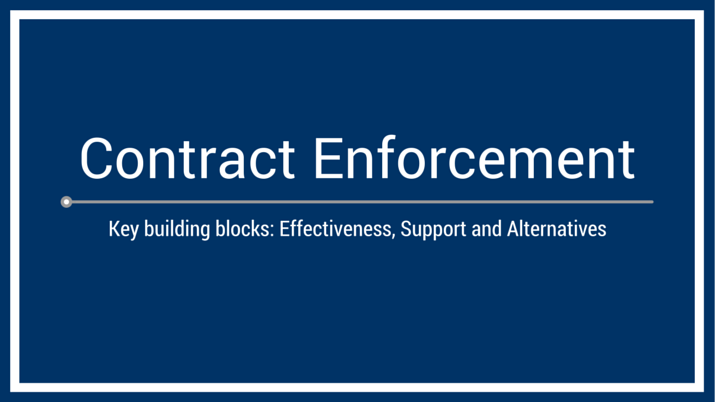Contract Enforcement for Businesses

Last Updated January 28, 2015
Contracts are essentially promises made by two or more parties to fulfill their part of a prearranged agreement. A society’s ability to enforce contracts, or its option not to enforce some of them under questionable conditions, is what gives contracts their significance.
When a contract partner fails to deliver on a promise, there are different ways to seek enforcement. The variations are due to the specifics of a particular contract, the laws of the state or country in which the agreement was made and the manner in which the contract was breached.
If there was a minor breach, discussion between the parties and some time provided to the offender for restitution are often all that is required. If there was a material breach, the non-breaching party is generally excused from performance in the agreement, and liquidated damages may be available to compensate the non-breaching party a specified amount.
Both breaches are affected by whatever is stipulated in the contract to handle them. In addition, the laws of a state or country may come into play when there are no clear directions for handling breaches or in some cases may even trump the terms of enforceability agreed upon by the contractual parties.
The key building blocks for enforcing legal obligations are:
- Effectiveness – There must be some mechanism to ensure that each party will stick to the terms of a contract. The main structures are self-enforcement (posting bonds, ending a commercial relationship), reputation (risking a future commercial relationship), organizational (third-party audits), technology (to monitor work) and contract law itself. The thorny issue is whether the cost and speed of these enforcement mechanisms are sufficient to improve confidence between contracting parties. To be effective, they must not outweigh the gains achieved from increased contractual commitment.
- Support – Equally important to having contract laws is the role legal institutions play in implementing them. The organization of courts, the presence of an independent and competent judiciary, the legal profession, enforcement services and the legislation process all combine to be a crucial influence in equality of treatment. Their level of efficiency also affects the cost of enforcement and therefore investors’ reliance and confidence in the entire system.
- Alternatives – The formal judiciary system can only handle so many contract disputes before it eventually loses all efficiency. Alternative resolution processes are designed to settle differences between parties in a timely and fair manner. Main examples include arbitration, mediation and conciliation hearings often conducted by industry bodies, specialized agencies or third-party evaluators. Alternative dispute settlement processes relieve judicial contract enforcement procedures and can strengthen contractual commitment at lower costs.
If there are rules defining contract enforceability, there are also circumstances that may render a contract unenforceable:
- Lack of capacity – If one side is shown not to have had the ability to completely understand the agreement and its implications, the contract may be held unenforceable against that person.
- Duress – Coercion—the threat of physical violence, psychological torment or economic punishment—will invalidate a contract.
- Undue influence – It can be argued that one party took advantage of a particularly persuasive relationship with another to apply excessive pressure tactics.
- Misrepresentation – If outright fraud, concealment or careless inaccuracies occurred during negotiations, an unenforceable contract might result.
- Nondisclosure – Essentially misrepresentation through silence, courts will try to decide whether or not a party had a duty to disclose information, and also whether or not the other party could or should have had access to the information.
- Unconscionability – This occurs when something about the agreement is so egregiously unfair that it cannot be allowed. A court will consider whether or not one side had grossly unequal bargaining power, the other had difficulty understanding the terms or the terms themselves were unfair.
- Public Policy – Contracts can be declared unenforceable because they represent a potential harm to society, something already against the law or offensive to “public sensibilities,” for instance.
- Mistake – An error on the part of one or more parties can render a contract unenforceable, but it must be shown to have had a significant effect on the bargaining process.
- Impossibility – In some cases, a contract is deemed unenforceable because it would be impossible or impractical to carry out its terms.
It’s easy to see the importance of enforceability in the contractual process. A careful consideration of enforcement provisions, added to an agreement and discussed between all parties before execution, can go a long way toward ensuring mutual satisfaction.





